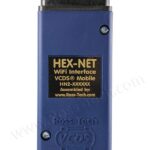Choosing the right EV charger is a significant investment. Nobody wants to shell out hundreds of dollars only to end up with a unit that underperforms or fails to meet their needs. That’s why rigorous testing is crucial. This review puts the Autel MaxiCharger Lite through a series of demanding tests to assess its performance and durability, focusing on key areas that matter most to EV owners.
Freezing Temperatures: Cable Flexibility and Performance
A critical test for any EV charger, especially in colder climates, is its ability to withstand freezing temperatures without compromising cable flexibility. The “Cable Deep Freeze Test” involves subjecting the MaxiCharger Lite’s cable to a 24-hour freeze at -16° F (-26.7° C) inside a commercial ice cream freezer. For comparison, the ChargePoint Home Flex, known for its cold-weather performance, underwent the same test for over 48 hours.
The results revealed a significant difference. While the ChargePoint cable remained remarkably flexible, the MaxiCharger Lite’s cable emerged stiff and resistant to bending. Although Autel has made improvements compared to previous versions, the MaxiCharger Lite still falls short in extreme cold.
Following the freeze test, the MaxiCharger Lite was immediately connected to a Chevrolet Bolt to evaluate its cold-weather charging capabilities. The unit powered on without hesitation and began charging, demonstrating reliable performance even after exposure to extreme cold.
Durability and Resilience: Drop and Heat Tests
The “Connector Drop Test” assesses the robustness of the charging connector by dropping it onto a concrete floor five times from waist height. Unlike its predecessor, which failed this test, the updated MaxiCharger Lite passed with flying colors, showcasing a durable and well-constructed connector.
Moving from the cold to the opposite extreme, the “Extreme Heat Test” evaluates the charger’s performance under high temperatures. The MaxiCharger Lite was subjected to a heat lamp for two hours, reaching 121.5° F (49.7° C). Subsequently, it charged a Chevrolet Bolt EV at maximum power for an additional two hours while continuing to bake under the heat lamp, ultimately reaching 153.5° F (67.5° C). Impressively, the Autel MaxiCharger Lite continued charging without issue, demonstrating resilience to extreme heat.
Power Outage Performance: Automatic Restart
The “Automatic Restart Test” simulates a power outage scenario to determine if the charger will automatically resume charging once power is restored. The MaxiCharger Lite passed this test, seamlessly resuming the charging process on the Chevrolet Bolt after a simulated power interruption.
Conclusion: A Solid Performer with Room for Improvement
The Autel MaxiCharger Lite proves itself a reliable and robust EV charger, excelling in durability, high-temperature performance, and power outage recovery. However, its cable flexibility in extreme cold remains a weakness compared to top performers like the ChargePoint Home Flex. While Autel has made commendable improvements, further enhancements in cold-weather cable flexibility would elevate the MaxiCharger Lite to a top contender in the EV charging market.

